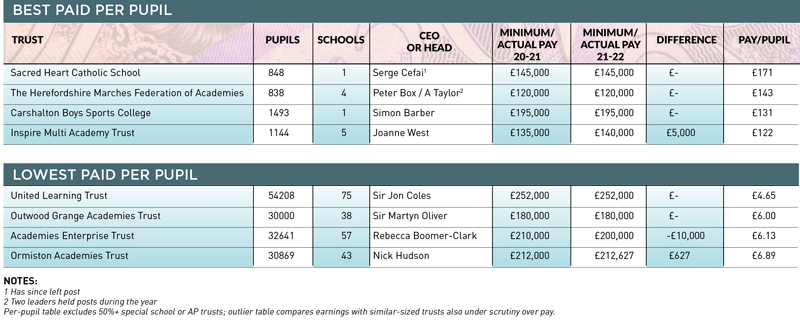Dozens of academy leaders have been identified as pay “outliers”, earning far more than their peers who run similar-sized trusts.
Schools Week’s annual executive pay investigation reveals most trusts under government scrutiny froze or slashed pay last year – but others handed out significant rises.
Some experts and leaders welcome new government scrutiny of pay “outliers”, but warn that metrics must be nuanced and action taken on stark gender pay gaps.
Outliers paid up to 100% more
Schools Week analysed the 2021-22 accounts for 246 trusts previously ordered by the government to justify having one £150,000 or two £100,000 salaries, and 31 large trusts known to pay £150,000 or more.
The Department for Education stopped sending warning letters in 2020 following data errors, but last month officials signalled a new focus on “outlier levels of leadership pay across similar academy trusts”.
No details have emerged on the definition of “similar”, but some experts say size often provides a good predictor of pay. The DfE says larger trusts generally “equate to bigger responsibilities”.
Our analysis found a moderate correlation between pay and pupil numbers.
Yet 50 trusts – 18 per cent – paid their chief executive 15 per cent above the average even among similar-sized trusts under scrutiny over high pay.
The 10 biggest outliers on this measure received on average more than 50 per cent – £108,000 – more than expected for trusts their size. They are all also among the highest-paid, earning £195,000 or more.
They include Sir Kevin Satchwell, the leader of the standalone high-performing Thomas Telford School and linked Thomas Telford MAT. His £290,000 minimum earnings – down on last year – are almost twice expected levels, based on pupil numbers.
The trust did not comment.
Moynihan nets £455k salary
The Harris Federation’s Sir Dan Moynihan, the country’s highest paid leader on £455,000, earned 60 per cent more than the £284,000 wage the model predicts given his 51 schools.
The turnaround trust recently celebrated the highest results of any large MAT in Progress 8 league tables, however, while Moynihan has helped raise millions for its schools. It did not respond to request for comment.
Doug Selkirk, chief executive of the 15-school Central Learning Partnership Trust, was paid £203,000, around a third above the expected salary based on size.
But seven of its 15 academies are special schools. Phil Williams, the trust’s chief financial officer, said per-pupil figures were “skewed” for special and new schools, with size too “narrow a set of parameters”.
He said phase, specialist provision, school challenges and central team size should also be factored in.
Such complex cases and the government’s past blanket approach raise questions about how sympathetic and nuanced its new clampdown will be.
High expectations

Leora Cruddas, who leads the Confederation of School Trusts (CST), said boards set pay “very carefully”. But trusts “vary widely in their size, type, and complexity”, making wage variation unsurprising.
Emma Knights, chief executive of the National Governance Association, added the government was undertaking a “very thorough analysis of what an outlier might be”, and welcomed the focus.
She said boards and the sector needed to consider whether hiking chief executive pay as trusts grew was “reasonable given this is public money”. She suggested boards consider pay ratios as a “cap or brake on endless rises with growth”.
But Helen Stevenson, director of the recruitment company Satis Education, said applicants to CEO posts often had higher salary expectations than boards.
“That’s always going to be a challenge until the government tackles outliers. Most boards accept it’s a market-driven sector now, so you have to make yourself appealing.”

Low-paying ‘outliers’ too…
Yet some trusts previously criticised over salaries could be seen as “outliers” for relatively low pay.
Sixty-eight trusts of wide-ranging sizes paid more than 15 per cent less than other trusts written to by government of comparable size. The £252,000 salary of Sir Jon Coles of United Learning is the seventh highest nationally, but 27 per cent below expected for the country’s largest trust.
Sir Martyn Oliver of Outwood Grange Academies Trust was similarly below expected, despite earning £180,000.
Both also rank as the two lowest-paid per pupil, with Coles’ wages equating to £4.65 per head and Oliver’s £6. Nine other trusts ranked below £10, whereas 80 trusts ranked more than £50 per pupil.
A spokesperson for the Meridian Trust, where Mark Woods’ £130,000 salary is £60,000 less than expected for a 28-school trust, said this reflected its use of maintained school pay scales, with an additional 10 points at the top given MAT leadership responsibilities.
Three of the lowest “outliers” are Christian trusts. Stevenson said the Catholic sector often offered lower salaries, seeing roles as “mission-led”, but she warned it risked “losing good-quality leaders”.
…and more likely to be women
Avearge salaries of female leaders were about £1,000 higher year-on-year, while men’s were near-flat.
Yet a pay gap of about £14,000 remains among the higher-paid, and only 30 per cent of chief executives analysed were women – compared with 76 per cent of teachers.
Nineteen of the 50 “outliers” for lower pay were women versus 14 of the 50 higher-pay “outliers”.
Only four women made the top 20 best-paid, and three because they were receiving salary in lieu of pension contributions.
Cruddas said the relative lack of female leaders was “disappointing”, while Stevenson urged female job applicants to seek advice on sector salaries “rather than accepting what’s presented”.
Viv Porritt, the leader of the campaign group WomenEd, said the sector had not treated “inequitable pay gaps seriously”.
“The gap between striking teachers and rising salaries for men at the top must be tackled by the sector and by government.”
Breaking the £200,000 mark
Thirty-five leaders were earning at least £200,000, up from 27 in 2018-19. Ten earned £250,000 or more.
On average, the trusts run by £200,000-plus earners run 27 schools.
However, data for another two trusts paying over £200,000 last year was unavailable, including Holland Park School in London – whose £280,000 salary for Colin Hall, its former head, made it the highest-paying standalone academy. The school is now part of United Learning following government intervention over high pay and allegations of a “toxic” culture.
A Loxford Schools Trust spokesperson said only £88,178 of Anita Johnson’s £240,000 salary was for her role as chief executive, with the rest relating to her headteacher role.
Including only the first element would slash her per-pupil CEO cost from £34 to £12, while using combined figures makes comparison “invalid and inaccurate”, they claimed.

Leigh Academies Trust and Delta Academies Trust chief executives Simon Beamish and Paul Tarn respectively received the biggest hikes in pay among the top 20, with rises of about £25,000.
A Delta spokesperson called Tarn an “exceptional leader of a very high-performing, non-selective trust”, making his performance and benchmarking-based pay “excellent value”.
Overall, 11 trusts had top earners on minimum pay bands at least 20 per cent higher than the year before.
The Diocese of Chelmsford Vine Schools Trust hiked Emma Wigmore’s minimum pay band by £30,000 to £120,000. A spokesperson said its pay committee had reviewed benchmarking data from similar-sized MATs and her performance.
Two in five trusts boosted current or new leaders’ pay overall, with average rises of 8 per cent.
It came in a year when most teacher payscales were frozen, and long-standing pay restraint has contributed to industrial unrest.
“Parents and the public would not expect pay to continue to increase whilst the pay of classroom teachers continues to be held down,” said Dr Patrick Roach, the general secretary of teachers’ union NASUWT.
Analysis shows signs of restraint
While pay rose 2 per cent on average among the top 20, it was virtually unchanged year-on-year among all the trusts analysed. The average pay was £151,000 – still above the £137,000 average in a wider CST trust survey.
Forty-four per cent of trusts froze executive pay and 15.5 per cent cut it, with declines averaging 18 per cent.
DfE analysis also suggests about 40 per cent of teachers received pay rises in the same year – despite frozen payscales.
Satis said senior salaries overall were “starting to level off”, with boards taking government concern over the £150,000 figure “seriously”.
Nine trusts cut pay by a third or more
Washwood Heath appointed new chief executive Peter Weir on £110,000, where his predecessor once earned £175,000. A spokesperson said it followed a “complete revitalisation” of the trust, with new trustees and leadership.
Steve Kenning’s minimum earnings at Aspirations Academy Trust fell from £250,000 to £230,000, while the pay of five of the best-paid 20 was frozen.
The Elliot Foundation’s Hugh Greenway said his £214,000 salary was frozen on unions’ recommendation, but as an “interested party” he should not comment further.
Sacred Heart Catholic School’s long-standing head in south London, Serge Cefai, ranked most expensive per pupil among majority-mainstream trusts on £145,000. But a spokesperson said his replacement at the single-academy trust earned less following Cefai’s retirement.

Pay below other sectors
Cruddas also highlighted recent CST research suggesting average trusts pay leaders less than their charity, public and private sector peers.

Jason Elsom, the chief executive of Parentkind, said running large MATs was “no different”, overseeing large workforces and budgets.
Yet CST research showed trust leaders surveyed handled budgets and staff far smaller than their charity peers.
Inside Housing found housing association CEO pay averaged £193,000 last year, up 1.8 per cent, while the Health Service Journal found 19 NHS leaders earned more than £250,000.
Elsom added: “Trustees should recognise parallels should continue when things go wrong. When a commercial entity is financially constrained, or failing to meet its objectives, the fallout impacts the CEO.”
Nerd note…
Trust information was taken from 2021-22 accounts.
Trust data varies, with actual pay data used where available but minimum pay band data used where not.
Some accounts listed pupil and school numbers from 2022, but others used 2021 data. When neither was available, Schools Week used DfE databases.
Additional reporting by Lauren Wright.









Whilst many of these salaries are individually outrageous, it is also worth considering that CEOs often appoint others to delegate their own work to with abandon, draining money from schools and often creating extra work for colleagues in schools to justify their own roles.
Correct me if I am wrong. The school conversion into becoming Academy Programme was initiated under the 1997 – 2010 Labour government. So was Building Schools for the future. Look at who is milking the system. Some schools do not even have money to purchase basic items. The PTA is forever being called upon to raise money.
Really interesting – it would be great if the model / formula was available! – what salary does ‘the model’ spit out when inputs of x number of pupils / y number of schools / z numbers of staff are inputted
Are all of the salaries based on FTE of 1.0 but some are not 1.0 in practice?
How common are fractional CEOs in MATs?
Thanks